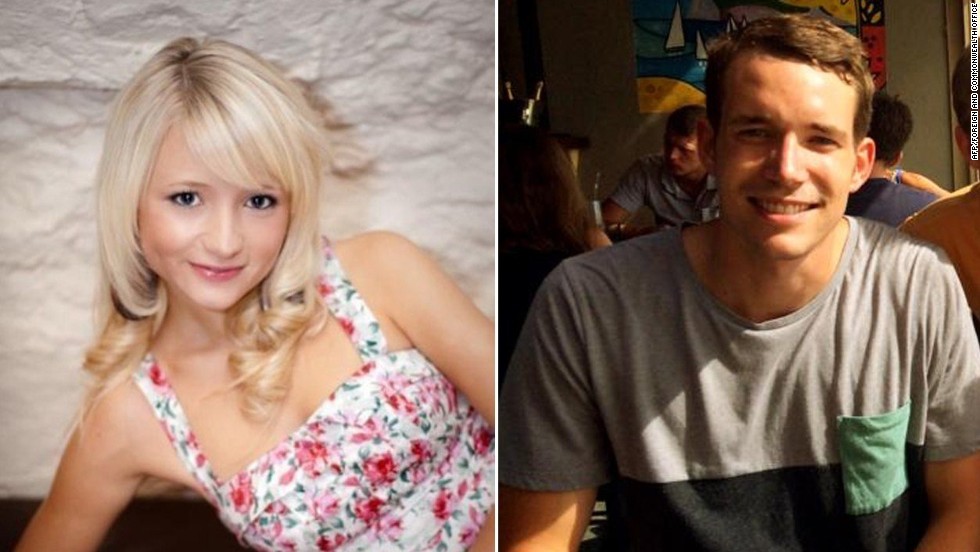
The trial of two 22-year-old Burmese migrants, Zaw Lin and Wai Phyo, accused of the murder of two British tourists on a Thai resort island last year, opens Wednesday in Koh Samui amid accusations of evidence mishandling, witness intimidation and possible coerced confessions.
The bodies of two young Britons, Hannah Witheridge — who was also raped, according to police reports — and David Miller, were discovered early on September 15 on a beach on Koh Tao, a small island in the Gulf of Thailand. They were partially undressed and had sustained severe injuries to their heads.
The Burmese pair, who were working in the hospitality industry on the island, were arrested around two weeks after the crimes committed and originally confessed, only to later recant, saying that their admissions of guilt were made under duress.
Thai police say that forensic evidence, including DNA samples from cigarette butts found near the bodies, tie the men to the scene.
Police Commissioner Gen. Somyot Poompanmuang previously told CNN that DNA in semen taken from Witheridge matched samples taken from the two men.
“The DNA matching result is out already and they matched with DNA found on the female victim,” he said, adding that the men admitted to raping Witheridge.
The parents of the two victims will attend the start of the trial, court officials said.
Flawed investigation
The two suspects’ defense team says that the investigation has been flawed due to “alleged mishandling of forensic evidence, abuse of suspects and intimidation of witnesses, particularly migrant workers living on Koh Tao,” according to a statement released by the Migrant Workers Rights Network (MWRN), a rights group assisting the defense team.
The trial, which is due to take place over 18 days between July and September, will open with the judge’s decision to allow the defense to reexamine the evidence.
The defense alleges that forensic crime scene evidence — including DNA samples from semen found on the body of Witheridge — was mishandled by the Thai Royal Police investigators.
“We’re confident that the request will be allowed as it is key to a fair trial,” said Andy Hall, International Affairs Adviser for MWRN.
“(The forensic evidence) is the main evidence for the trial. We haven’t seen any evidence (besides the disputed DNA samples) to link them to any of the crimes.”
Nakhon Chompuchat, the lead lawyer for the two suspects told CNN the defense would not ask for a postponement in the event that the court granted a re-examination of the evidence. He also said that if the request was not granted he would resubmit it.
British police involvement
Given the international attention on the case and the status of the two victims as British nationals, the UK government has sought to engage Thai officials.
MWRN says that the National Crime Agency and other British agencies have been “involved” in the case, although a Metropolitan Police statement suggested that UK police officials were there strictly as observers.
The defense team has expressed concern that the British involvement has yielded evidence that, while admissible in court, has not been provided to the defendant’s lawyers.
Accusations of coercion
In October, the defendants told Aung Myo Thant, a lawyer attached to the Myanmar embassy, that they only admitted the crime after being beaten by the police and threatened with electrocution.
“They said they didn’t do it, that the Thai police (along with their Myanmar-Thai translator) beat them until they confessed to something they didn’t do,” Aung told the Bangkok Post at the time.
“They’re pleading with the Myanmar government to look into the case and find out the truth. They were a really pitiful sight. Their bodies had all sorts of bruises. I have already reported all that I have seen… to my government.”
At the time, the national police chief denied the police had extracted the confessions through the use of torture.
Thai Department of Special Investigation Deputy Director General Wannapong Kotcharat declined to speak to CNN about the case.
Kosolwat Intuchanyong, Deputy Spokesman to the Office of the Attorney General, said his office had received complaints from the victims’ families and defense team and had instructed the regional office of the Attorney General to conduct further interviews that were incorporated into the case, but had ultimately decided that the Attorney General had enough evidence to proceed with the trial.
Alleged bias against migrants
A perceived judicial bias against migrant workers in Thailand has long been noted by rights agencies.
“It’s critical that the two accused migrant workers get a free and fair trial that fully accords with international fair trial standards,” Phil Robertson, the Deputy Director of the Asia Division of Human Rights Watch told CNN.
“Migrant workers have hardly ever been treated well by the Thai police, and not always been dealt with fairly by the Thai criminal justice system, so in migrant communities in Thailand there are ample suspicions about this case.”
Hall agrees that migrants in Thailand “face severe challenges in the criminal justice system,” and that this case provides “clear evidence of that.”
However, despite this historical disadvantage, the defense team hopes the international attention the case has received will ensure the trial will be fair and transparent.
“We’re confident that the trial will be fair because of the international focus. (The Thai legal system) is challenged on many fronts but this can be a showcase for Thai justice,” Hall said.
“Our task is to ensure that there is a fair trial where both sides have access to all the evidence.”
As reported by CNN
